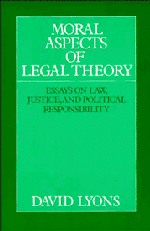Book contents
- Frontmatter
- Contents
- Preface
- Acknowledgments
- 1 The internal morality of law
- 2 On formal justice
- 3 Legal formalism and instrumentalism - a pathological study
- 4 Moral aspects of legal theory
- 5 Formal justice and judicial precedent
- 6 Derivability, defensibility, and the justification of judicial decisions
- 7 Constitutional interpretation and original meaning
- 8 A preface to constitutional theory
- 9 Basic rights and constitutional interpretation
- 10 Critical analysis and constructive interpretation
7 - Constitutional interpretation and original meaning
Published online by Cambridge University Press: 10 December 2009
- Frontmatter
- Contents
- Preface
- Acknowledgments
- 1 The internal morality of law
- 2 On formal justice
- 3 Legal formalism and instrumentalism - a pathological study
- 4 Moral aspects of legal theory
- 5 Formal justice and judicial precedent
- 6 Derivability, defensibility, and the justification of judicial decisions
- 7 Constitutional interpretation and original meaning
- 8 A preface to constitutional theory
- 9 Basic rights and constitutional interpretation
- 10 Critical analysis and constructive interpretation
Summary
CONSTITUTIONAL ORIGINALISM
By “originalism” I mean the familiar approach to constitutional adjudication that accords binding authority to the text of the Constitution or the intentions of its adopters. At least since Marbury, in which Chief Justice Marshall emphasized the significance of our Constitution's being a written document, originalism in one form or another has been a major theme in the American constitutional tradition.
Indeed, originalism can seem to be the only plausible approach to judicial review. One might reason as follows: “A court cannot decide whether an official decision conforms to the Constitution without applying its rules. The Constitution was written down to fix its content, and its rules remain unchanged until it is amended. Courts have not been authorized to change the rules. So courts deciding cases under the Constitution should follow the rules there laid down. By what right would courts decide constitutional cases on any other grounds?”
That challenge is conveyed by writings on judicial review that are regarded as originalist. But it is misleading. Most of the positions that are condemned by contemporary originalists accept the authority of the Constitution. Although originalists present the issue as fidelity to the Constitution, it primarily concerns, I shall argue, how the Constitution is to be interpreted.
A distinctively originalist mode of interpretation assumes that the doctrinal content of the Constitution was completely determined when it was adopted and that constitutional doctrines can be identified by a valuefree factual study of the text or of “original intent.”
- Type
- Chapter
- Information
- Moral Aspects of Legal TheoryEssays on Law, Justice, and Political Responsibility, pp. 141 - 168Publisher: Cambridge University PressPrint publication year: 1993



